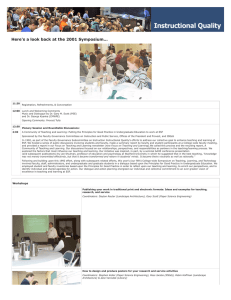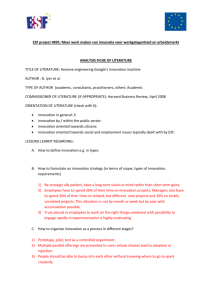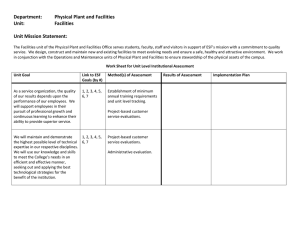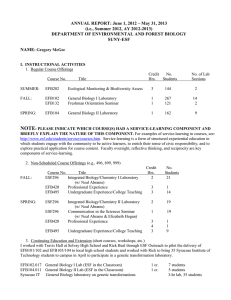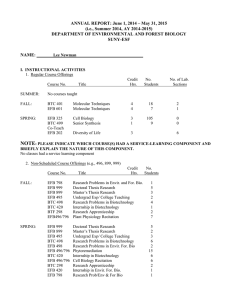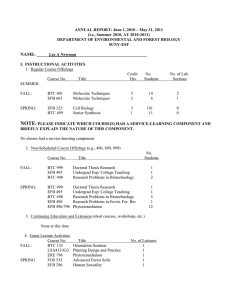Here's a look back at the 1999 Symposium...
advertisement
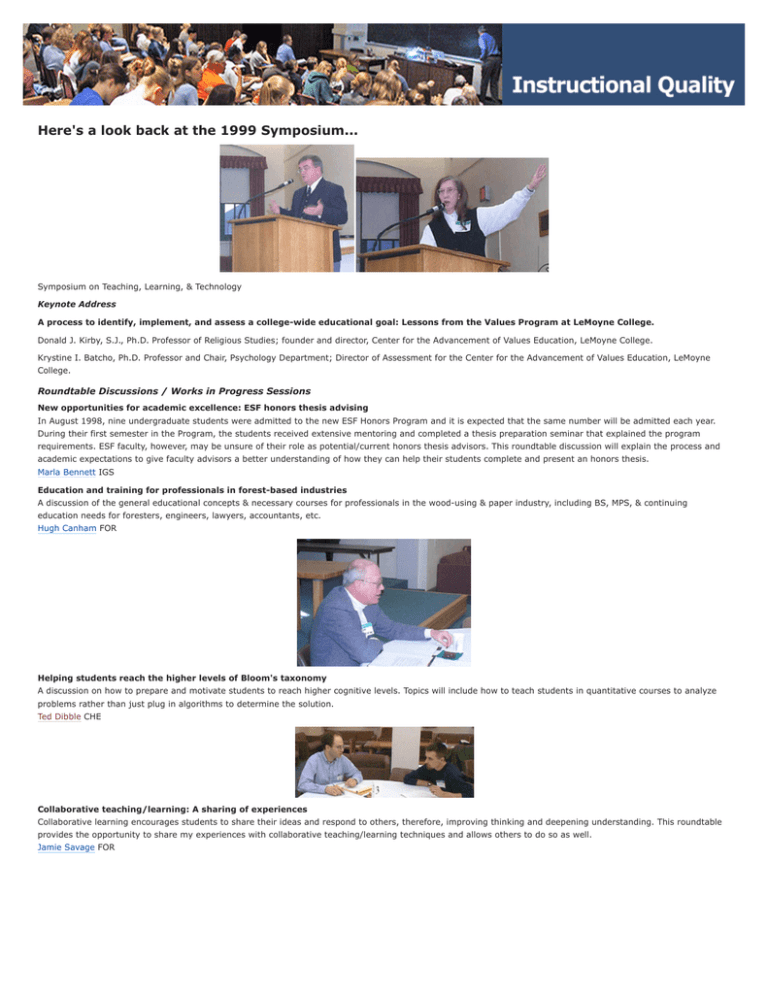
Here's a look back at the 1999 Symposium... Symposium on Teaching, Learning, & Technology Keynote Address A process to identify, implement, and assess a college-wide educational goal: Lessons from the Values Program at LeMoyne College. Donald J. Kirby, S.J., Ph.D. Professor of Religious Studies; founder and director, Center for the Advancement of Values Education, LeMoyne College. Krystine I. Batcho, Ph.D. Professor and Chair, Psychology Department; Director of Assessment for the Center for the Advancement of Values Education, LeMoyne College. Roundtable Discussions / Works in Progress Sessions New opportunities for academic excellence: ESF honors thesis advising In August 1998, nine undergraduate students were admitted to the new ESF Honors Program and it is expected that the same number will be admitted each year. During their first semester in the Program, the students received extensive mentoring and completed a thesis preparation seminar that explained the program requirements. ESF faculty, however, may be unsure of their role as potential/current honors thesis advisors. This roundtable discussion will explain the process and academic expectations to give faculty advisors a better understanding of how they can help their students complete and present an honors thesis. Marla Bennett IGS Education and training for professionals in forest-based industries A discussion of the general educational concepts & necessary courses for professionals in the wood-using & paper industry, including BS, MPS, & continuing education needs for foresters, engineers, lawyers, accountants, etc. Hugh Canham FOR Helping students reach the higher levels of Bloom's taxonomy A discussion on how to prepare and motivate students to reach higher cognitive levels. Topics will include how to teach students in quantitative courses to analyze problems rather than just plug in algorithms to determine the solution. Ted Dibble CHE Collaborative teaching/learning: A sharing of experiences Collaborative learning encourages students to share their ideas and respond to others, therefore, improving thinking and deepening understanding. This roundtable provides the opportunity to share my experiences with collaborative teaching/learning techniques and allows others to do so as well. Jamie Savage FOR Courseware: Is ESF ready to adopt a standard? The advantages of using the internet as an aid for instruction delivery are becoming a reality. The technology is inexpensive, faculty, students, and classrooms are wired. Most of us use computers to prepare our paper-based course materials, and email to communicate. A few of us have begun course web pages, but this has proven much more challenging. In recent years, many universities have adopted standard "courseware" software packages to facilitate the transition. This approach opens up new opportunities (and maybe limitations). Is it time for ESF to adopt a courseware standard and provide assistance in putting courses up on the web? John Felleman ES Documenting teaching activities for promotion and tenure packages A discussion involving suggestions on how to document the scholarship of teaching Jim Hassett/Cheryl Doble ERFEG/LA Preparing and presenting distance learning courses Reflections on recent experiences using ESF's "smart classroom", an integrated multi-media classroom, to teach on-campus students and to produce videotapes for ENGINET distance learners. Paul Hopkins ERFEG Integrating speaking into courses: One step in developing life-long professional communication skills Natural resources managers must be able to speak in public with confidence and power. Most courses that include an oral communication component only focus on scripted presentations. For the past three years, I have attempted to integrate impromptu communication skills into my courses to introduce students to public speaking when they do not have the benefit of preparation. We will discuss the advantages of integrating unrehearsed speaking into courses and some methods that enable students to begin to develop this professional skill. Bob Malmsheimer FOR How do we teach professional ethics: Is there need for improvement? What methods do we use to prepare our students to adopt ethical standards and the codes of ethics that exist in the professional world they will encounter after graduation? Whether our students enter a business arena, an academic, industrial, or scientific field, or public service, they need to make decisions grounded in their experience with ethics. Should we expand our current efforts to teach ethics that are appropriate for specific disciplines? Can we identify new approaches that will enhance such training within the constraints that exist within set curricula? Steve Keller PSE How and why to use undergraduate teaching assistants As an undergraduate, I was a teaching assistant. I have used undergraduate TAs in my courses for nearly 20 years. We will discuss the many advantages (and few disadvantages) of selecting undergraduate students to assist faculty as TAs in our courses at ESF. We will examine why undergraduates can be very effective TAs, how they can be recruited, and what their responsibilities include. Additionally, we will discuss personal and professional benefits to the TA, and how TAs can be evaluated. Don Leopold EFB Involving students in course summaries: Benefits to students, feedback to faculty A discussion of creative ways to catch the attention of your students on "Day One" of your class as well as interesting and different ways of wrapping up on the last day of class. Valerie Luzadis FOR Using computerized test scoring services through IDEaS A discussion of the use of multiple choice exam questions and electronic scoring in a relatively large class. Discussion will include logistics and statistical analysis of performance on individual questions. Larry Smart EFB Getting the most from the GA/faculty relationship A discussion focusing on typical problems encountered in the GA/faculty relationship and ways to solve those problems. There will also be suggestions for ways to enhance the GA learning experience. Jack Tessier EFB Return to the Symposium Home page
